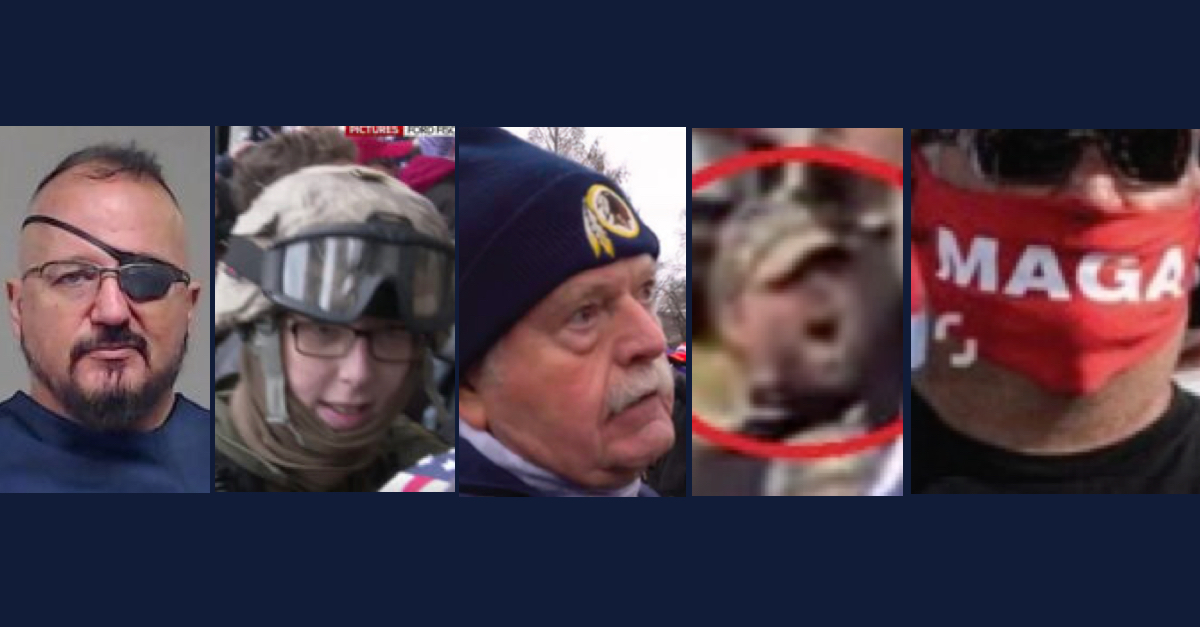
Left-Right: Stewart Rhodes, Jessica Watkins, Thomas Caldwell, Kenneth Harrelson, Kelly Meggs. (Image of Rhodes via the Collin County, Texas Jail; other images via FBI court filings.)
Jury selection in the trial of five people charged with plotting to block the peaceful transition of presidential power on Jan. 6, 2021, began Tuesday, with some jurors expressing outright bias both against and in favor of the defendants.
Stewart Rhodes, Jessica Watkins, Kenneth Harrelson, Thomas Caldwell, and Kelly Meggs had the chance to face the people who will ultimately decide their case, as U.S. District Judge Amit Mehta brought 29 potential jurors in for questioning Tuesday. The five defendants are the first group to be tried for seditious conspiracy in connection with the Jan. 6 attack on the U.S. Capitol, when Donald Trump supporters angry over the incumbent’s loss to Joe Biden in the 2020 presidential election forced their way inside the building and temporarily forced a halt to Congress’ certification of the electoral votes.
Four co-defendants — Roberto Minuta, Joseph Hackett, David Moerschel, and Edward Vallejo — are scheduled to go to trial in November.
On Tuesday, Mehta started making his way through individual questioning of 121 potential jurors. Over the course of the day, the judge, prosecutors, and defense counsel had the chance to vet 29 people; Mehta would ultimately dismiss 12 of them.
To the extent that defense lawyers — who have repeatedly asserted that a D.C. jury wouldn’t be fair — anticipated a cavalcade of Washington residents hostile to their clients on Tuesday, some jurors didn’t disappoint.
“There weren’t many protests I didn’t attend in Washington, D.C. during the Trump administration, inauguration day,” the first would-be juror explained when asked to expand upon his affirmative response to a question about whether he had attended any rallies or protests in the past five years. The juror also said that he felt fear for the country as he watched the chaos unfold that day and compared it to the Sept. 11, 2001 terrorist attacks on the World Trade Center in New York and the Pentagon in Washington.
Mehta dismissed him from the jury pool.
“I strongly believe [Jan. 6] was an insurrection led by right-wingers to reverse a free and fair election,” another potential juror said, before telling Mehta she did not believe she’d be able to put her personal beliefs aside. She was also dismissed from the jury pool.
“I live in Washington, D.C., and this is my home, and I feel like they invaded my home,” another juror said before Mehta dismissed him.
“I would be fair, but it would be difficult,” one would-be juror who had attended rallies in support of upholding abortion rights established in Roe v. Wade said when asked if she felt she could be impartial in judging people who may have different political views from her. “I believe some political parties are unfair. I tend to think that they are racist, and I am a Black woman.”
Moments later, she made her views even clearer, using the phrase “neo Nazis” to describe people who attend Trump rallies.
Despite expressing a fondness for criminal defense attorneys — her father is one — none of the defendants’ lawyers objected when Mehta said he would dismiss her from the jury pool.
Whoever gets selected for the jury, they will not likely hear allegations that the Oath Keepers is an organization that espouses white supremacist views. After Caldwell attorney David Fischer raised concerns about a potential juror — a woman of Asian-American descent who told Mehta that her family had at one point been targeted with “racially-charged incidents” — Mehta emphatically said that no evidence of the Oath Keepers being a white supremacist organization would be allowed at trial “unless a reason I cannot think of” arises.
One juror, however, indicated that he was inclined to favor the defendants. Early on during his questioning, the man — who said he is a lawyer himself — complained that those accused with crimes in connection with Jan. 6 were facing significantly harsher sentences than people who, according to him, were “destroying buildings” and tearing down statues during protests following the 2020 death of George Floyd Jr.
He complained that the FBI has “rounded up 800 people” in its expansive prosecution of those allegedly involved in Jan. 6 and signaled that he didn’t want to be a part of it.
“If you see there’s going to be a travesty and you’re going to be a part of it and say [prosecutors] proved the predicated elements of the case . . . it wouldn’t assuage my conscience,” the man said.
Mehta dismissed him from the jury pool. Neither the prosecutors nor defense attorneys objected.
Other indicia of support for Jan. 6 defendants could be seen in the courtroom Tuesday: Nicole Reffitt — the wife of Guy Reffitt, a member of the Three Percenter militia group who was the first Jan. 6 defendant to be convicted by a jury — made a brief appearance, while another person in the courtroom was seen wearing a t-shirt that appeared to express support for Timothy Hale-Cusanelli, a Nazi sympathizer who was sentenced Tuesday to four years behind bars for his role in the Jan. 6 siege.
Rhodes, whose recent efforts to delay his trial date have been thwarted by Mehta, has compared his trial to those in notoriously oppressive regimes.
“It’d be like being tried in Putin’s Russia right now, or in China,” Stewart told right-wing online host Joe Oltmann on Monday, adding that he believes that the jury pool in Washington is “hostile” to him and his co-defendants.
Oltmann, a Colorado-based conservative activist and businessman, was accused in a defamation lawsuit brought by the head of security for Dominion Voting Systems in connection with baseless claims of vote tampering in the 2020 presidential election.